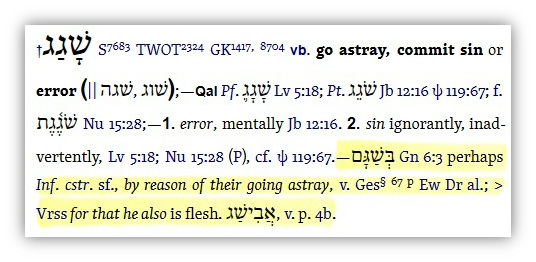Peace.
This speaks of the internal struggle of the Spirit of God with man who is “also flesh”….that is, man who is living after the flesh and not walking in the Spirit as he was supposed to.
This is not about the mortal body of flesh itself but is talking about the deeds of the flesh that man (who had His Spirit within them) was engaged in during this time.
Genesis 6:3 KJV (3) And the LORD said, My spirit shall not always strive with man, for that he also is flesh: yet his days shall be an
hundred and twenty years.
The Spirit and the flesh (man living after the flesh: envy, strife, wrath, etc) are contrary to one another. There is an internal conflict within as the Spirit strives against the flesh and vice versa.
Galatians 5:16-26 KJV (16) This I say then, Walk in the Spirit, and ye shall not fulfil the lust of the flesh. (17) For the flesh lusteth
against the Spirit, and the Spirit against the flesh: and these are
contrary the one to the other: so that ye cannot do the things that ye
would. (18) But if ye be led of the Spirit, ye are not under the
law.
Man living after the flesh behaves in the flesh in his envy, strife, wrath, uncleanness, etc.
Man is “also flesh” when he continues to do the works of the flesh rather than putting to death these things through the Spirit of God…and so there is conflict. The works of the flesh are manifest:
(19) Now the works of the flesh are manifest, which are these; Adultery, fornication, uncleanness, lasciviousness, (20) Idolatry,
witchcraft, hatred, variance, emulations, wrath, strife, seditions,
heresies, (21) Envyings, murders, drunkenness, revellings, and such
like: of the which I tell you before, as I have also told you in time
past, that they which do such things shall not inherit the kingdom of
God.
But the fruit of the Spirit is:
(22) But the fruit of the Spirit is love, joy, peace, longsuffering, gentleness, goodness, faith, (23) Meekness, temperance: against such
there is no law. (24) And they that are Christ's have crucified the
flesh with the affections and lusts.
The works of the flesh are to be put to death through the Spirit of God within us. If we live in the Spirit, we are to walk in the Spirit and not fulfill the lusts of the flesh where the Spirit of God strives with the man who does continue to live after the flesh.
(25) If we live in the Spirit, let us also walk in the Spirit. (26) Let us not be desirous of vain glory, provoking one another, envying
one another.
If we continue to live after the flesh (being “also flesh”), we shall die:
And the LORD said, My spirit shall not always strive with man, for that he also is flesh: yet his days shall be an hundred and twenty years.
But, if through the Spirit (that dwells within us) do we deaden the deeds of the body, we shall live. His Spirit will not always strive with us....for we shall die if we continue to live after the flesh (my Spirit will not always strive with man for he is ALSO flesh).
*Romans 8:12-14 KJV (12) Therefore, brethren, we are debtors, not to the flesh, to live after the flesh. (13) For if ye live after the
flesh, ye shall die: but if ye through the Spirit do mortify the deeds
of the body, ye shall live
The “sons of God” before the flood were not being completely led by the Spirit of God as they were behaving as men in the “flesh”. They were not walking with God in the Spirit but were bogged down with their works of the flesh which grieved the Spirit.
The Spirit of God was striving with those men as they walked according to the deeds of the flesh and not according to the Spirit and so there was conflict.
(14) For as many as are led by the Spirit of God, they are the sons of God.
God was grieved at His heart....
Genesis 6:5-6 KJV (5) And GOD saw that the wickedness of man was great in the earth, and that every imagination of the thoughts of his
heart was only evil continually. (6) And it repented the LORD that he
had made man on the earth, and it grieved him at his heart.
Grieving the Spirit of God is continuing to live after the flesh when we have been sealed with His Spirit and have not put these things to death yet: the bitterness, wrath, anger, evil speaking, etc. There is conflict between the Spirit and the flesh as they are contrary to each other but God is patient with us not wanting us to perish but come to repentance. But His Spirit will not always strive with us....as His Spirit did not always strive with man who was ALSO FLESH before the flood.
Ephesians 4:30-32 KJV (30) And grieve not the holy Spirit of God, whereby ye are sealed unto the day of redemption. (31) Let all
bitterness, and wrath, and anger, and clamour, and evil speaking, be
put away from you, with all malice: (32) And be ye kind one to
another, tenderhearted, forgiving one another, even as God for
Christ's sake hath forgiven you.
Thanks for reading and considering.

